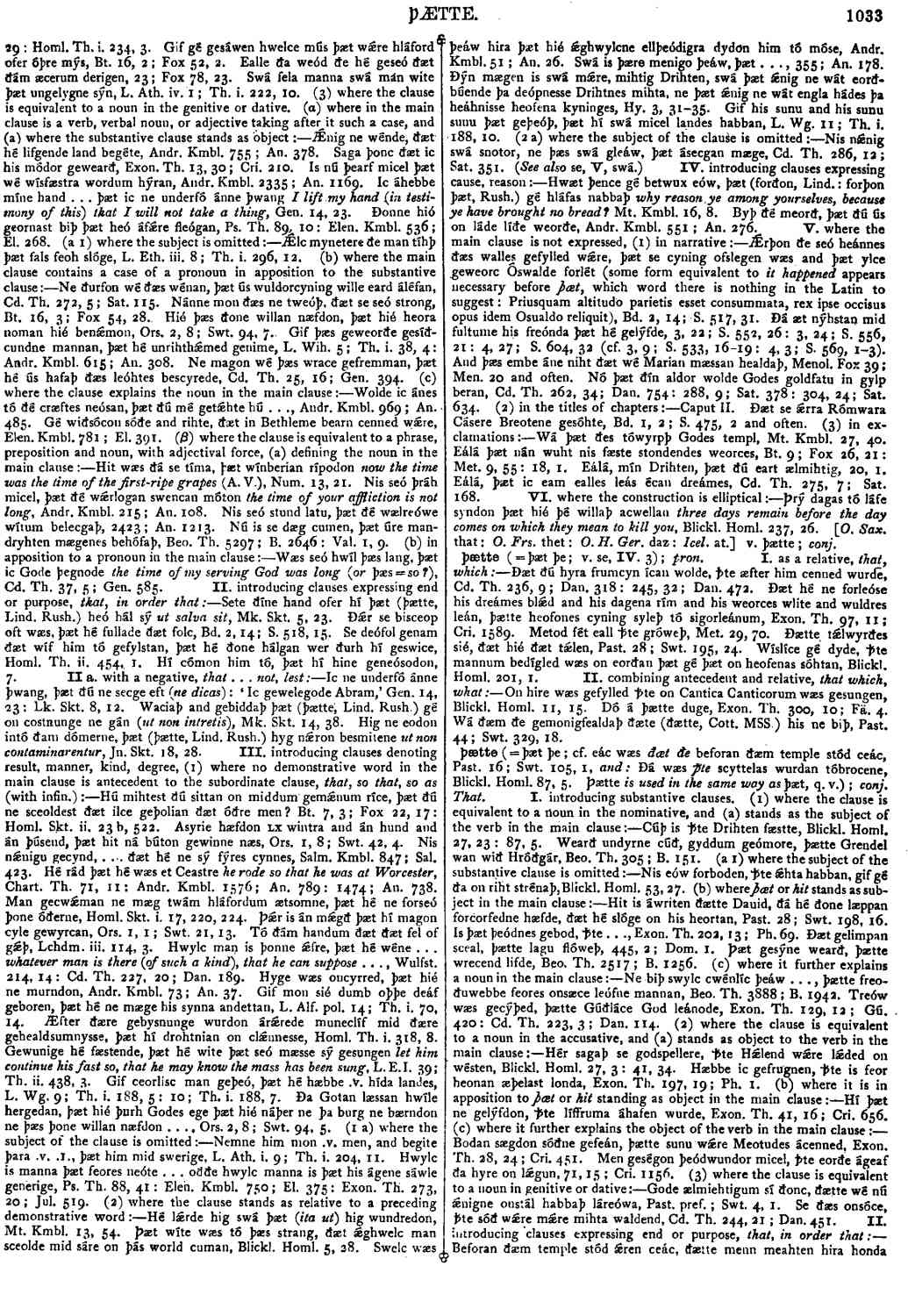þætte
- conjunction
-
Cúþ is ꝥte Drihten fæstte,
- Blickl. Homl. 27, 23 : 87, 5.
-
Wearð undyrne cúð, gyddum geómore, þætte Grendel wan wið Hróðgár,
- Beo. Th. 305; B. 151. (a 1) where the subject of the substantive
clause is omitted :-- Nis eów forboden,
ꝥte
-
Hit is áwriten ðætte Dauid, ðá hé ðone læppan forcorfedne hæfde, ðæt hé slóge on his heortan,
- Past. 28; Swt. 198, 16.
-
Is þæt þeódnes gebod, ꝥte . . .,
- Exon. Th. 202, 13; Ph. 69.
-
Ðæt gelimpan sceal, þætte lagu flóweþ,
- 445, 2; Dom. 1.
-
Þæt gesýne wearð, þætte wrecend lifde,
- Beo. Th. 2517 ; B. 1256.
-
Ne biþ swylc cwénlíc þeáw . . . , þætte freoðuwebbe feores onsæce leófne mannan,
- Beo. Th. 3888; B. 1942.
-
Treów wæs gecýþed, þætte Gúðláce God leánode,
- Exon. Th. 129, 12; Gú. 420 : Cd. Th. 223, 3; Dan. 114.
-
Hér sagaþ se godspellere, ꝥte Hǽlend wǽre lǽded on wésten,
- Blickl. Homl. 27, 3 : 41, 34.
-
Hæbbe ic gefrugnen, ꝥte is feor heonan æþelast londa,
- Exon. Th. 197, 19; Ph. 1.
-
Hí þæt ne gelýfdon, ꝥte líffruma áhafen wurde,
- Exon. Th. 41, 16; Cri. 656.
-
Bodan sægdon sóðne gefeán, þætte sunu wǽre Meotudes ácenned,
- Exon. Th. 28, 24; Cri. 451.
-
Men geségon þeódwundor micel, ꝥte eorðe ágeaf ða hyre on lǽgun,
- 71, 15; Cri. 1156.
-
Gode ælmiehtigum sí ðonc, ðætte wé nú ǽnigne onstál habbaþ láreówa,
- Past. pref. ; Swt. 4, 1.
-
Se ðæs onsóce, ꝥte sóð wǽre mǽre mihta waldend,
- Cd. Th. 244, 21; Dan. 451.
-
Beforan ðæm temple stód ǽren ceác, ðætte menn meahten hira hondaðweán,
- Past. 16; Past. 105, 1.
-
Sprec tó ðínum discipulum, ꝥte sý geblissad heora heorte, and hié sýn ofergytende ðisse sǽwe ege,
- Blickl. Homl. 233, 36.
-
Hí wénaþ ꝥ hí mægen eall ðás gód gegaderian tógædere, þætte nán búton ðære gesomnunga ne sié,
- Bt. 24, 4; Fox 86, 3.
-
Daniel sægde him wíslíce wereda gesceafte, ꝥte sóna ongeat cyning ord and ende ðæs ðe him ýwed wæs,
- Cd. Th. 225, 28; Dan. 161.
-
Woldon hié feorhleán fácne gyldan ꝥte hé ꝥ dægweorc dreóre gebohte
so that he should pay for that deed with blood,
- 187, 14; Exod. 151. (1 a)
-
Nis ǽnig man þætte swá bereáfod sié
- , Met. 22, 49.
-
Nǽnig manna is þætte áreccan mæg,
- Andr. Kmbl. 1091; An. 546 : Cd. Th. 210, 2; Exod. 509.
-
Hé beóþ swá geþwǽra, þætte nó ꝥ án ꝥ hí magon geféran beón, ac ðý furþor ꝥ heora nán búton óþrum beón ne mæg,
- Bt. 21; Fox 74, 17.
-
Ðǽr wæs swíþe swéte stenc swá ꝥte ealle ða slépan ðe ðǽr wǽron,
- Blickl. Homl. 145, 29.
-
Ðínne líchoman hié tóstenceaþ swá ꝥte ðín blód fléwþ ofer eorðan swá swá wæter,
- 237, 6. (2 a) where the subject of the clause is omitted :--
ꝥ nis nán man, ꝥte
-
Ðonne hí niðer ástígaþ tó áðweánne hiera niéhstena scylda, hié beóþ onlícost suelce hí beren ðone ceák . . . , ðætte (
the case is such, that
) suá hwelc suá inweard higige tó gangenne on ða dura ðæs écean lífes, hé ondette ǽlce costunge,- Past. 16; Swt. 105, 14.
-
Æfter ðæm ðe Rómeburg getimbred wæs twá hunde wintra and IIIIX, þætte (
it came to pass, that
) Cambisis féng tó Persa ríce,- Ors. 2, 5; Swt. 78, 2 : 4, 1; Swt. 154, 2.
-
And ðæs embe fíf niht ðætte fulwiht tiid éces Drihtnes tó ús cymeþ,
- Menol. Fox 22; Men. 11, and often.
-
Eálá ꝥte ðis moncyn wǽre gesǽlig, gif heora mód wǽre riht
- , Bt. 21; Fox 74, 40.
-
Ðætte oft ðæs láreówdómes ðénung biþ swíðe untǽlwyrðlíce gewilnad,
- Past. 7, arg.; Swt. 47, 20, and often.
Bosworth, Joseph. “þætte.” In An Anglo-Saxon Dictionary Online, edited by Thomas Northcote Toller, Christ Sean, and Ondřej Tichy. Prague: Faculty of Arts, Charles University, 2014. https://bosworthtoller.com/31503.
Checked: 0